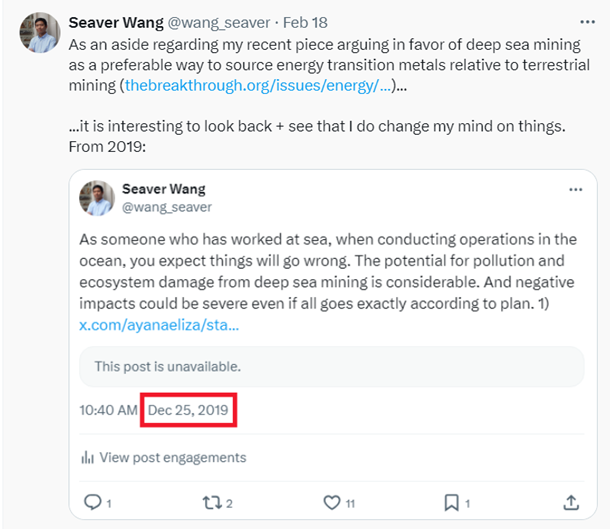In a piece entitled, “Sparing the Land by Collecting Minerals at Sea,” ocean scientist Seaver Wang, Co-Director of Climate and Energy at The Breakthrough Institute, makes the case that collecting nodules may be better for the planet than the alternative – mining on land. This, of course, is a theme our regular readers will recognize.
This opportunity to pioneer a new dramatically lower-impact form of mining highlights how important it is for environmentalists and ocean scientists to critically reexamine the automatic instinct to oppose any further alteration of our seas.
Seaver Wang
Breakthrough Institute (“BTI”) is an organization that, “focuses on identifying and promoting technological solutions to environmental and human development challenges…” The group is perhaps most famous for its Ecomodernist Manifesto – a report that detailed how technological advancements can help decouple economic growth from the growth of environmental impacts. It’s an optimistic philosophy that asserts that the world can be made better through technological innovation. Regardless, BTI is a well-respected and thoughtful think tank, backed by some powerful people (to include Bill Gates’s Breakthrough Energy Ventures), so Seaver’s report carries real weight.
We had been beating the “decoupling” drum loudly long before we started COMRC. The data clearly show that nodule harvesting technology can help us grow our critical energy mineral base while reducing the amount of environmental and human damage per unit of mineral produced – decoupling our impacts from the growth these minerals allow. This pathway can create windfall gains to society as a whole and it’s an obvious fit with the ecomodernist philosophy.

Seaver’s report takes readers through the case for harvesting as a partial replacement for mining. He talks about the villainization of harvesting industry figures, walks through the process of harvesting, lets loose on some of the absurd arguments made by the eco-doomsayers, and finally calls for pragmatic discussion on practical matters around technology and regulation.
This is a clear case of activists and reporters spawning scientific conclusions from their imagination to fit a desired narrative.
Seaver Wang
Yet, it’s not what Seaver argues in the report that was most meaningful to us. What struck us about the work was how much Seaver struggled with it. He calls himself a heretic for siding with James Cameron (who believes nodule harvesting is “less bad,”) and evokes images of nodule extractors as dastardly villains. Later in his report he writes about the deep love that marine scientists (such as Seaver) have for the ocean and their desire to protect its pristine and fragile areas. He even points to a tweet from 2019 where he firmly denounced the idea of seabed mining. Ostensibly this reference was to prove his mental flexibility, but we think that it was also his way of saying “I used to be one of you, so you know I’m a good person.” In any case, it is clear that Seaver didn’t relish the process that produced the report – in fact, he probably fought it. He feels it necessary to let people know that he’s still a good person despite his new stance.

So, why would Seaver Wang, an intelligent and accomplished scientist and environmental analyst, struggle to follow the empirical data, scientific inquiry, and logic on this topic, which has only belatedly taken him to a supportable conclusion? In part, as he says himself, it’s due to his love for the ocean. Yet, it goes well beyond that simple explanation. It’s caused by something that we’ve witnessed a hundred times or more in discussions we’ve had with people from all walks of life. The environmental lobby has created so much noise and misinformation about the prospect of nodule extraction, preying specifically on the natural biases that people (including Seaver) hold for the ocean and against mining, that the public has begun to harbor feelings of shame for even thinking about extracting minerals from the deep.
It’s as if environmentalists have built a fort of morality, forged from the emotion they illicit from society, to protect the ocean from nodule harvesting. That fort, due to its moral standing, cannot be subjected to normal questioning based on critical thought, empirical data, or the scientific method. In fact, the idea of questioning environmentalists’ position on seabed extraction using objective standards inspires fear from most people who believe they will be seen as immoral for having the temerity to doubt.
If a screenwriter were writing a new film with an anti-environment villain, one of the easiest ways to establish the moral bankruptcy of the antagonist would be to make the character a corporate industrialist hell-bent on mining the deep ocean.
Seaver Wang
The strategy of building a moral fortress has worked spectacularly for environmentalists. They’ve trapped many powerful and influential people, and legions of regular folks, with the promise of moral high ground. Governments, politicians, car companies, technology companies, insurance companies, scientific organizations, and more, have all been fooled into believing they are demonstrating their commitment to goodness by joining in a call for a moratorium on nodule harvesting.
But opponents of nodule collection are engaging in exaggeration, cherry-picking, and misleading messaging that clearly call into question their rhetorical commitments to let the science speak
Seaver Wang
Yet, as Seaver mentions in his report, the alternative to nodule harvesting is less good. So, these virtue signalers are, ironically enough, bringing harm to the planet with their calls for a moratorium. Despite environmentalist proclamations that we don’t need to mine, and that we can recycle and innovate to a state of green nirvana, Seaver notes that this isn’t remotely close to possible. Thus, a ton of nickel or cobalt that we don’t take from the bottom of the ocean will require us to blast, cut, or drill to extract nearly 500 tons of waste rock from underneath a tropical rainforest – demolishing a piece of the world’s most sensitive and biodiverse ecosystem in the process. In addition, we will emit far more CO2 than we would if we used nodules. We will poison and kill people that could be saved by farming nodules. We will destroy freshwater resources unnecessarily, endanger more species, and destroy far more biomass than we would if we extracted these minerals from the sea floor. Moreover, the moratorium helps enable China and Russia to retain greater control over our commercial and military capabilities, while forcing the West to compromise its ideals and cut deals with some fairly unseemly characters. That white hat is looking kind of dirty, huh?
A broader look at activist campaigns against seafloor nodule collection suggests that opponents simply aren’t interested in scientific impact assessments to begin with.
Seaver Wang
Seaver dared to peer over the parapet of the fortress and saw good rather than evil. So, he broke through the fort’s wall and had the nerve to subject the anti-deep sea mining campaign to a normal course of scientific diligence. What he found was a lack of moral superiority. In fact, he found a lot which should mortify environmentalists and their supporters – should they take a moment to introspect. Our hope is that the hole in the wall which Seaver created will allow other objectively minded environmental groups to see their way out of the fortress in which they have become trapped.
TMC holds webcast and presents benthic plume data